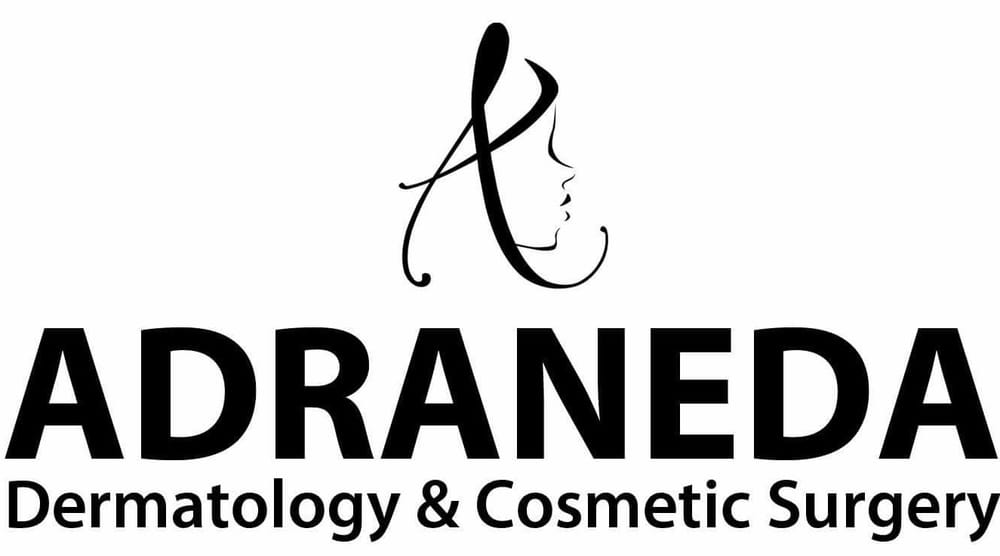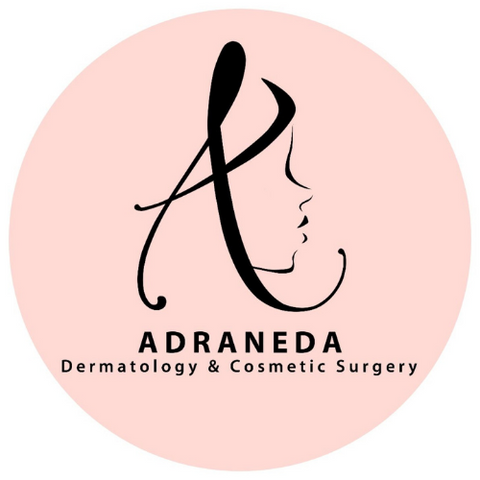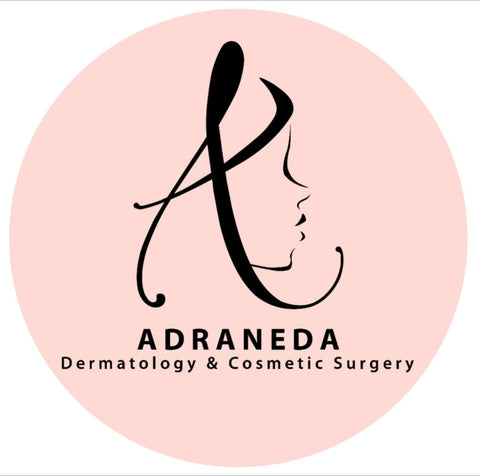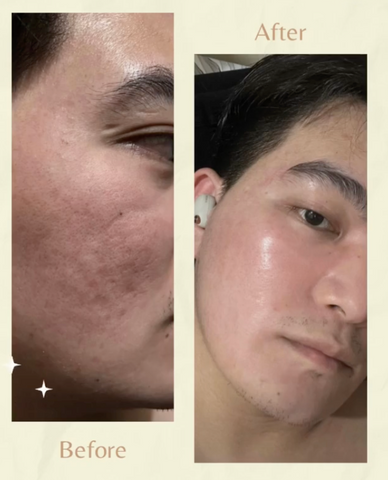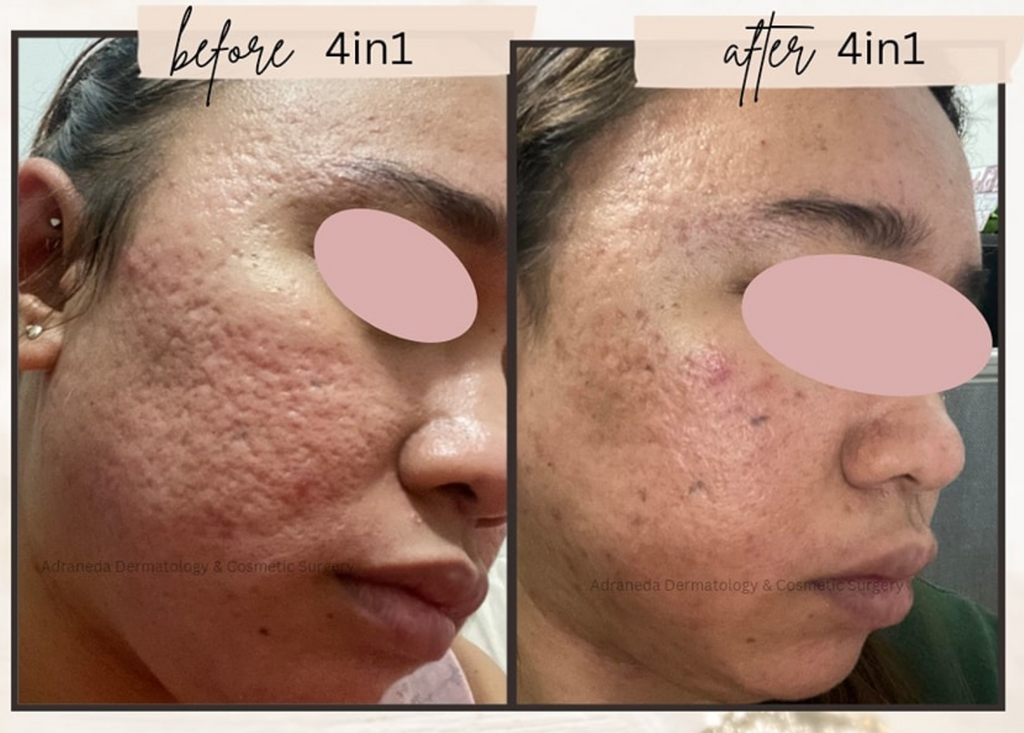
4in1 Synergistic Acne Scar Treatment
4in1 Synergistic Acne Scar Treatment includes RF Fractional Microneedling, TCA CROSS, Subcision and PRP.
First, we use RF Fractional Microneedling to stimulate collagen production and reduce the appearance of scars. This technique uses tiny needles to create micro-injuries in the skin, which triggers the body's natural healing process.
Next, we use Subcision to break up scar tissue and release it from the surrounding skin. This technique involves inserting a cannula under the skin and using it to break up the fibrous bands that cause scarring.
Then, we use 100% TCA Cross to target deep, pitted scars. This technique involves applying a high concentration of trichloroacetic acid (TCA) directly to the scar, which causes it to peel and reveal smoother skin underneath.
Then we use PRP (Platelet-Rich Plasma) to promote healing and rejuvenation. This technique involves drawing a small amount of your own blood, processing it to concentrate the platelets, and then injecting it into the treatment area.
FREQUENTLY ASKED QUESTIONS
Q: What is RF FRACTIONAL MICRONEEDLING (RFM)?
RFM delivers the desired energy through gold plated insulated needles that penetrate the skin to a predetermined desired depth. By delivering heat energy from RF to dermis, RFM encourages collagen growth and tissue tightening without harming the epidermis.
Radiofrequency Fractional Microneedling helps improve acne scars by producing collagen in the dermis. It also helps improves skin laxity and mild wrinkles.
"The mechanisms involved are neo-collagenogenesis by needle penetration stimulating the release of growth factors and relative sparing of epidermis and adnexal structures which contribute to rapid healing."
(Chandrashekar BS, Sriram R, Mysore R, Bhaskar S, Shetty A. Evaluation of microneedling fractional radiofrequency device for treatment of acne scars. J Cutan Aesthet Surg. 2014;7(2):93-97.)
In 1 study, skin laxity and wrinkles were evaluated after Fractional Radiofrequency treatments and the authors concluded that it is an effective procedure with substantial improvement achieved 3 months post procedure with continued improvement to at least 6 months.
"This clinical improvement is consistent with the timeline for increases in collagen, elastin, and hyaluronic acid and the corresponding volumization, elasticity, and skin laxity improvements previously reported after FRF treatment." (Alexiades-Armenakas M, Newman J, Willey A, Kilmer S, Goldberg D, Garden J, Berman D, Stridde B, Renton B, Berube D, Hantash BM. Prospective multicenter clinical trial of a minimally invasive temperature-controlled bipolar fractional radiofrequency system for rhytid and laxity treatment. Dermatol Surg. 2013 Feb;39(2):263-73. doi: 10.1111/dsu.12065. Epub 2012 Dec 28. PMID: 23278964.)
Q: What is SUBCISION?
Subcision
💉 Treatment: Subcision
👩⚕️ Purpose: Subcision is a minor surgical procedure used for treating depressed cutaneous scars and wrinkles.
🔎 Procedure: Subcision is performed using a special needle or cannula inserted through a puncture in the skin surface. The sharp edge of the needle is used to break fibrotic strands that are tethering the scar to the underlying tissue. The release of the fibrotic strands and new collagen deposition caused by wound healing leads to cosmetic improvement of the scar.
🙋♀️ Patient selection: The decision to perform subcision will depend on the type, location, and severity of scarring; patient preference and expectations; and clinician experience and expectations.
How many sessions is needed? Since rolling scars have a tendency to recur, a minimum of 3-4 sessions is usually advised to make the results more permanent.
Subcision may be used for the treatment of:
• Depressed distensile scars (due to acne, trauma, surgery )
• Depressed bound down scars (due to acne*, varicella(chickenpox), trauma, surgery )
• *excluding deep ice-pick scars
• Acne scars - Rolling scars
❌Subcision may not be suitable in the following circumstances:
• Current or recent (within 12 months) of high dose systemic oral retinoid (eg acitretin, isotretinoin)
• Bleeding or blood clotting disorders (coagulopathy)
• Active bacterial or viral infection
The risks and complications of subcision include:
1. Haematoma due to bleeding (a small haematoma is normal)
2. Pain/tenderness of treated site
3. Infection; this usually presents as localised acneform papule or pustule
4. Temporary post-inflammatory hyperpigmentation(advise sun protection/avoidance)
5. Sub-optimal response or lack of improvement in scarring
6. Injury to nerve or blood vessel, which is most likely in mandibular, temporal and pre-auricular sites
Q: What is TCA CROSS?
TCA CROSS (Chemical Reconstruction of Skin Scars) procedure involves depositing small amounts of high concentration TCA (70–100%) onto the surface of the acne scar. This causes a mild inflammatory reaction resulting in the formation of new collagen fibers.
Most patients require 3 to 6 treatments with TCA CROSS for optimum improvement. Treatments may be repeated at 2 to 8 week intervals over 6 months and may be combined with other treatment modalities for best results.
Q: What is PRP?
PRP treatment or Vampire Facial is the hottest trend in acne scar treatment and skin rejuvenation. It was made popular by Kim Kardashian who underwent the treatment for skin rejuvenation. It involves extracting a small amount of blood from you, which is then spun down in a centrifuge to separate the plasma. This plasma now contains a higher than normal number of platelets and is called platelet rich plasma, or PRP.
Why Platelets Rejuvenate Skin
Platelets are the cells in the blood that help tissue to heal and grow new cells. The PRP, injected into specific areas of the skin, is like a fertilizer that promotes your own collagen to grow, regenerates tissue, and thus acts as to naturally smooth and tighten the skin. In this way, PRP softens wrinkles and creating smoother skin texture and tone.
Q: How many SESSIONS of acne scar treatment do I need?
The rate of improvement / number of sessions will depend on several factors like age, skin type, scar type, immunity and home care regimen. For rolling type of scars, improvement is generally seen after 2-3 sessions of Synergistic Acne Scar Treatment, while for boxcar and icepick scars, improvement is normally seen after 3-6 sessions. The more sessions you undergo, the better is the improvement, with up to 90% improvement after completing 5-10 sessions.Q: What is the DOWNTIME of the treatment?
Q: What is the treatment INTERVAL?
Q: How soon can I see results?
Results can usually be seen as quickly as 6 to 8 weeks after the 1st session. For Rejuran S, both short term and long term effects on scar healing and treatment can be observed. The initial effects that patients frequently notice will be smoothness, hydration and glow of the skin. Collagen production usually starts 1 month after the treatment procedure and the patient will then notice gradual and progressive improvement in the scar appearance, reduction in depth and severity of acne scars.
As the best results are seen with about minimum 4 treatments, progressive sessions will further enhance the scar healing and collagen stimulation effects of previous sessions.
Results from acne scar treatment improves further with time. So don't worry if you don't see improvement right away after 1 session of treatment. The more you induce collagen production, the better the results will be.
"Radiofrequency microneedling-induced dermal remodeling and neocollagenesis are slow and progressive but continue to improve even 6 months after treatment."
-Tan MG, Jo CE, Chapas A, Khetarpal S, Dover JS. Radiofrequency Microneedling: A Comprehensive and Critical Review. Dermatol Surg. 2021 Jun 1;47(6):755-761. doi: 10.1097/DSS.0000000000002972. PMID: 33577211.
Q: What SKINCARE REGIMEN do I need after treatment?
- apply cold compress during the 1st 24 hours after subcision; then warm compress on the following day
- Use the recommended skincare regimen
- May start applying makeup after the 3rd day
- May exercise after the 3rd day
Dont's:
- Rub or use rough towel during the 1st week
- Expose under the sun for long periods of time
- Eat salty and fishy (malansa) when you have swelling
#acnescars #4in1treatment #RFmicroneedling #TCAcross #PRP #subcision #skincare #beauty
